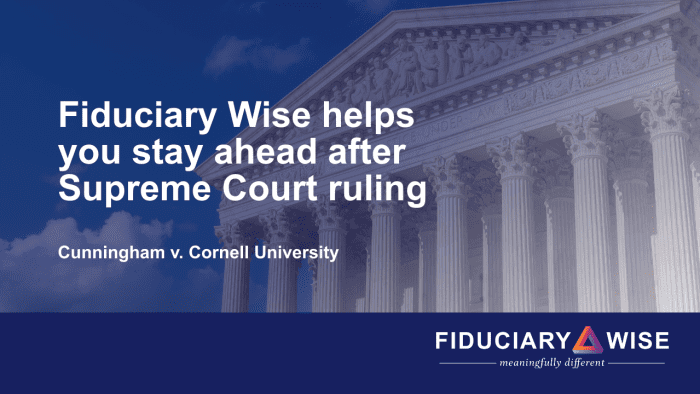So You’re Going To Be on a Plan Administrative Committee!
The Responsible Fiduciaries of a retirement plan have significant fiduciary obligations to manage the plan assets and oversee operations. The guidelines of the Employee Retirement Income Security Act of 1974 (ERISA) require the named fiduciaries of the Plan to carry out due diligence in running the Plan. A very good way to address these fiduciary obligations is to create an administrative committee to address these requirements. If you’re going to be on a Plan’s governing committee, then you may want to consider the following lighthearted summary.
As a committee member, am I a fiduciary?
Almost certainly. A person is a fiduciary to the extent they have any discretionary authority or responsibility in the administration or management of a plan or exercises any discretionary authority or control with respect to the management or disposition of the plan’s assets. Under this definition, Committee members will be functioning as fiduciaries for purposes of ERISA.
What is my liability if I serve on a committee?
Under ERISA 409(a) you will be personally liable for any act or omission on your part during your tenure which violates fiduciary responsibility rules. You will be happy to know that ERISA 409(b) provides that a fiduciary shall not be liable with respect to a breach of fiduciary duty if it occurred prior to you becoming a fiduciary 1 But you’re not completely off the hook for prior actions. You have a duty to review investments, procedures, etc., and if you become aware of any problems you must take corrective actions. 2 Similarly you are not liable for any fiduciary breaches after you cease to be a fiduciary, unless you resign and there is no provision for someone else to carry on your duties, or if you’re aware of a breach and the only remedy you take is to resign!
What is my responsibility
Actually think of having two “prime directives”! Under ERISA you have a duty of loyalty to the participants. Every action taken must be for the exclusive benefit of participants and beneficiaries. If you always ask yourself, “does this action exclusively benefit participants”, then you will be a long way down the road to doing a good job. If your action benefits anyone else, then you could be running afoul of the prohibited transaction or conflict of interest issues. Now ERISA does not prohibit a fiduciary from acting also as a nonfiduciary in making business decisions for your company that are in your favor, or that of your firm. You still can act as an officer, employee or agent for your company. Just be careful your actions don’t cause you to run counter to your first “prime directive”.
A second “prime directive” is that as a named fiduciary, under ERISA 404(a)(1)(b) you are required to exercise the care, skill, prudence and diligence under the circumstances under the high standards mandated by ERISA. This means you are required to have familiarity and expertise with the areas you are involved in. But if you don’t have expertise, then you must recognize the need and seek expert assistance. You would be served well to remember the phrase “a pure heart and an empty head are not good enough”, which came from Donovan v. Cunningham (716 F.2d 1455, 1467)
Can I just hire someone else to be a fiduciary?
Yes, running your own company can be a full-time job! (ah come on, it was a little funny!) Fiduciary responsibility may be allocated among different named fiduciaries. ERISA provides some relief for the fiduciary of direct liability for duties that are delegated to another fiduciary.3 But, and this is a big but (no pun intended), this doesn’t insulate you from liability if it’s an improper delegation. A common situation is when a plan sponsor hires a service provider for “3(16) fiduciary services”. All too often the service provider’s agreement precludes them from being a fiduciary as they are a ministerial administrative firm. If you are hoping to delegate fiduciary responsibility, be sure your service providers state in writing they accept and serve in a fiduciary capacity under ERISA §402(a), (often regarded as the highest level fiduciary), §3(16) (administrative fiduciary) §3(38) (investment fiduciary) or §3(21) (investment co-fiduciary) for the tasks that are being delegated, and are experts capable of serving in that capacity.
What if I discover something wrong?
ERISA §405(a) imposes liability for knowing and concealing a breach of fiduciary duty, even if it is by a co-fiduciary. Under trust law principles the duty of loyalty places a requirement on plan fiduciaries to both monitor and remedy any wrongs of which they become aware. So it’s clear and simple, if you become aware of a problem you must take effective steps to correct!
So how do we run a plan administrative committee?
When creating a plan administrative committee, it is important to document the authority, duties, and obligations of the committee and how it will exercise its authority. The workings of a committee are rarely set out in the plan document. Accordingly, it’s wise to incorporate the use of a charter or by-laws delegating authority to the committee. Within this document you can specify the members of the committee and any specific delegation of duties, if any.
The next step is to establish procedural prudence for your oversight of the plan by the delegation of duties. Broadly speaking this means setting up the protocol for selecting and monitoring investments, making sure the plan is being run in accordance with the terms of the plan document and applicable regulations.
You should then schedule and participate in regular meetings to conduct your review and discuss actions. Invite key personnel in your company who can contribute to the discussions. Also, you should require a representative of every service provider to report on key aspects of their duties. For example your investment professional provides reports on how the plan assets are performing, recordkeepers report on plan activity, administrative firms report on plan compliance, etc.
Key to all of this effort is keeping good quality records of your committee meeting documenting the elements of review and the decision process for all actions taken. If the Department of Labor, or a participant’s attorney comes calling, if you don’t have meticulous records, then you will be treated as if the meeting never occurred.
1: 29 U.S.C. §1109(b) 2: Barker v American Mobil Power Corp. 3: 29 U.S.C. §1105(c)(1)




